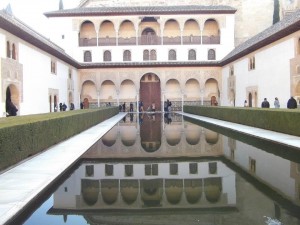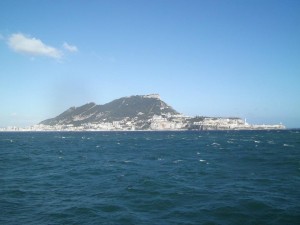What the World Doesn’t Understand About the Arab Spring
A few months ago, I took the boat from Andalusia to Morocco. From the Spanish port town of Algeciras to the Spanish enclave of Ceuta (Sebta) behind Jebel Mousa. From Babylon to Zion. From Europe to Africa.
As the boat broke through the waves linking the Atlantic and the Mediterranean, I went up to the top deck to marvel Gibraltar. The mountain rock that is Europe’s southern edge, on the very edge of which, a huge white minaret stands today.
In my younger days, I have studied about Gibraltar, in Arabic ”Jebel Tareq” in reference to Tareq ben Ziad, the general who extended the Islamic empire into Iberia in 710 AD. Once he landed with his army upon Gibraltar, he cast the boats back into the sea, or burned them, and said to his soldiers, “You have two choices: the sea is behind you, and the enemy is ahead of you.” The same method and the same line were used later by Spaniards in their conquests of America.
Travels through Andalusia, Portugal and Morocco have shown me an extent of how civilizations really influenced one another, Arabs, Africans, Europeans, Latin Americans, they all have had a stake at building these lands. They’ve always exchanged knowledge and goods, through colonization, through trade, through travels, through war, peace and love.
However, today, in a fortress world, the old beacons of prosperity in Europe and North Africa are now exchanged with post-modern, consumerist societies in unjustly banked systems, societies of human-bots under growing surveillance. Yet the future is not beyond hope: emotional intelligence will always defeat IQs and artificial intelligence.
 Alhambra – Granada. A beacon of co-existence during the Islamic Empire days in Andalusia
Alhambra – Granada. A beacon of co-existence during the Islamic Empire days in Andalusia
While the world’s diverse cultures are still caught up in discussing sin and sainthood, smaller fractions in all societies are rising beyond this debate to discuss enlightenment and ignorance (read in post-modern terms).
Before heading to Andalusia, Portugal and Morocco I have been earlier in Jordan and Egypt, carefully witnessing a subtle transformation from authoritarianism to democracy. From Cairo’s Tahrir Square, to Amman’s coffee houses, to the Medinas and Casbahs of Fez, Tetuan and Tanger, there’s an unbreakable urge to re-establish prosperous societies, like the ones Arabs, Moors and Spaniards had in Cordoba and Granada.
The real revolution is happening in the minds of these people, not only in the political circles nor at the voting centers. For the first time ever, during my whole 30 years of growing up in the region and revisiting it often since I moved to Sweden in 2005, there’s an abundance of new air around the people of Jordan, Egypt and Morocco – and I can only imagine what it is like in Libya, Syria, Yemen, and elsewhere in the region.
The first great milestone is breaking taboos. There are no longer topics that are taboo. Everything is discussable: in every taxi cab or other means of transportation, in cafes, villages, mosques and most importantly at homes, the very values of democracy are weighed against the apathy and fear that have plagued the region since the establishment of these make-shift states after World War I. People are no longer hesitant to discuss any societal, political issue at the house hold level – where democracy begins in any modern, civil, and prosperous society.
The rise of the Islamists is nothing to be too wary off. In the midst of this huge bazaar of ideas, discussions, and with all the feelings that are finally being let out after decades of oppression – the Islamists came out as the only organized former opposition parties – and they are voted in to take command in the haste of having to re-establish order in these societies, which do have deeper roots in Islam than in any other ideological matrix.
The Islamic parties will now have to think in technocratic terms. They will soon have to drift away from discussing sin to think about GDP and GNP, about resources, about climate change, and about trade and welfare. Their success or failure to lead these societies towards the long aspired destination is intensively monitored and scrutinized in social circles, on social media, in traditional media, mosques, and other forums – and they know it, they feel the pressure, and will eventually leave the talk of morality and get into business. They will have to neutralize, or fail.
Meanwhile other parties will be established and will gain wider support. Those who are next in line, are those who really struck the nerve that started these revolutions: the youth with an unwavering longing to a civil and just society, to equal opportunities, and to prosperity. It is the youth in the Arab world that the world should bet on, invest in, and encourage to lead the future of these societies into one where alliances are made across the Mediterranean, the Atlantic, further east and further south. Alliances to build on personal enlightenment, economic prosperity, and social equality.
The western industrialized world will soon trap itself in a protectionist fortress with high walls, unless it can keep up with the changes in this region and others. China and India are already rising, and the revolutionary fever is breaking through Africa, Latin America, and is even echoing within the fortress west itself. The real challenge ahead is to not to regress into discussions on morality (which entails superiority) but rather not to be judgmental of global changes, and invest in an sustainable manner.
Globalization is unstoppable, but to reap its real benefits, we will have to move beyond thinking in national terms. Approaching the 2020s, we will have to think more in planetary terms. And in order to do so, we have to invest in forces that align societies together and create wide-spread order based on self-determination.
We need to recreate our societies to allow everyone an equal chance to prosperity, like they did in Andalusia, like they do in many modern nations and other nations of old.
For a closer understanding of the real values and opportunities created by the Arab Spring, watch the Yemeni Nobel Peace Prize winner Tawakol Kurman address these issues during a recent seminar in Stockholm, Sweden. I am helping her with interpretation. Watch the video here:http://urplay.se/167868.
Post as …
Sort By …Popular nowBest ratingNewest firstOldest first
![]()
Husam Aldahiyat
2 hours ago
Rubbish article.
The ideas were naively laid out and poorly conjoined in a piss poor attempt at writing something publishable. You jumped from one topic to another, changing gears frequently and leaving the reader lost and confused at each turn. When I finished reading I thought there was a second page to be read as not even the “bold” title is justified or further touched upon anywhere else in this poor excuse of a story.
Now I know how Tawjihi English teachers feel when grading exam essays.
![]()
Rami Abdelrahman
23 minutes ago
Husam – I am sorry indeed that you didn’t get it. write your own, mate.
.







